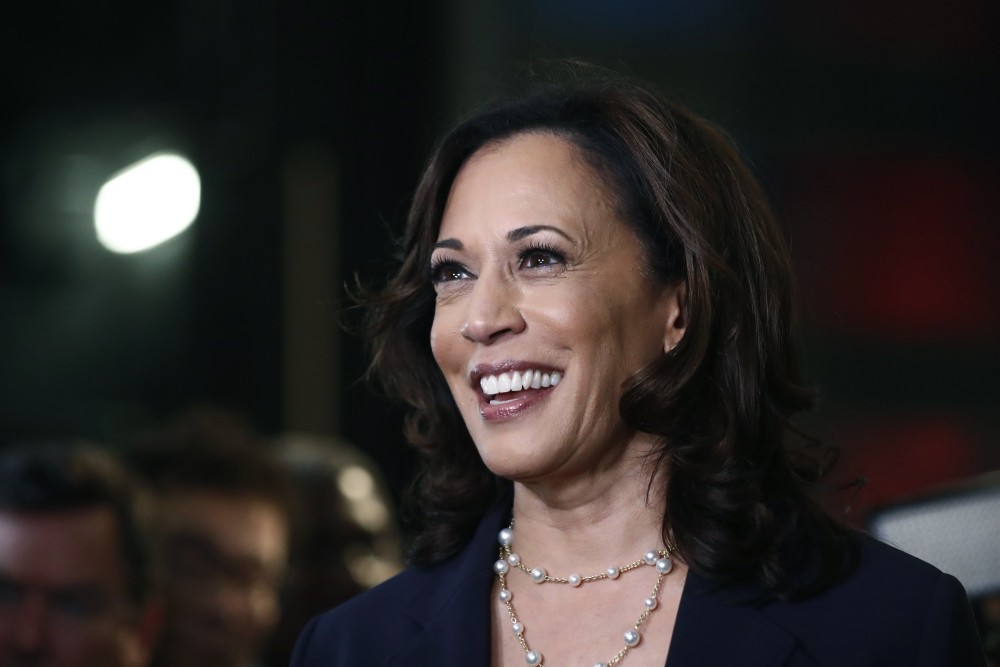Observers of religion say Harris looks like the future of the nation

Kamala Harris filled two criteria that Joe Biden wanted in a running mate: she is a woman, and she is black, two critical Democratic constituencies ahead of the November elections.
But Harris, the 55-year-old junior senator from California, has other advantages in the 2020 presidential race. She embodies the future of American religion: in a time of expanding religious pluralism, the country’s younger generation, many of them children and grandchildren of immigrants, will recognize in Harris a kind of multifaith and spiritual belonging unfamiliar to the mostly white Christian majority of past decades.
Harris, who was born in Oakland, California, to a Jamaican immigrant father, Donald Harris, and an Indian immigrant mother, Shyamala Gopalan, is both black and South Asian. She grew up in a home that accommodated both Christian and Hindu religious practices.
Read our latest issue or browse back issues.
As an adult, she married Douglas Emhoff, a Jewish, Brooklyn-born lawyer.
“There are a lot more young Americans who, identity-wise, are like Kamala Harris—mixed race, with a background of lots of different cultural, ethnic, and religious experiences,” said Eboo Patel, founder and president of the Interfaith Youth Core. “That’s just a demographic fact.”
That’s particularly true for members of the Democratic Party and its electoral coalition, which skews younger and is more racially and ethnically diverse than the Republican Party’s base. It also affiliates less with traditional religion.
To be sure, Biden and Harris identify as Christian—he a Catholic, she a black Baptist. But the ticket represents a stark contrast to President Donald Trump and Vice President Mike Pence, who are both white, Protestant, and male.
Harris, who is a member of Third Baptist Church of San Francisco, brings an ethnically and racially diverse version of Christianity to the ticket. She also has an appreciation of the contributions of non-Christians, some of whom happen to be her family members.
A Pew Research report last year found the United States is steadily becoming less Christian and the number of people with no religion is rising. Christianity still leads—65 percent of Americans describe themselves as Christians—but white Christians are a minority, at about 42 percent of the country, said Robert P. Jones, CEO and founder of the Public Religion Research Institute.
In that sense, said Jones, “the Biden-Harris ticket looks a lot more like America’s future and the Trump-Pence ticket looks a lot more like America’s past.”
Looking at the religious affiliation of Americans by age, the contrast is even starker, said Jones.
“In terms of their racial and religious makeup, self-identified Democrats look about like 30-year-old America, while self-identified Republicans look about like 70-year-old America,” he said.
The Republican Party has seen demographic changes in its ranks as well. Nikki Haley, who served as ambassador to the United Nations under Trump from 2017 to 2018, was born into a Sikh family and converted to Christianity shortly after marrying a Methodist. (Their wedding ceremony combined both Sikh and Christian elements.)
Likewise, Bobby Jindal, a former governor of Louisiana, was born into a Hindu family and converted to Catholicism in high school.
Such religious switching, along with multiple religious belonging, is part of America’s dynamic religious landscape and is only likely to grow even more commonplace.
“I remember as a pastor having one of my most active families be one where one of the spouses had grown up in a traditional Baptist household in the South and the other was Jewish and had grown up in a Jewish household in the Northeast,” said Derrick Harkins, national director of interfaith outreach at the Democratic National Committee. “They were one of my most active and engaged families.”
University chaplains see this all the time, said Rachel A. Heath, a former chaplain and now a PhD student at Vanderbilt University who is writing her dissertation on Christian responses to multiple religious belonging.
In such an atmosphere, Harris’s eclectic religious background is as likely to be an asset as a distraction in the run-up to the November 3 election.
“I don’t think her religious biography will be a negative in the campaign,” said John C. Green, director emeritus of the Ray C. Bliss Institute for Applied Politics at the University of Akron. “There may be people who complain. But I don’t see those complaints having much resonance, because she represents a trend that’s an increasingly common pattern.” —Religion News Service (RNS national reporter Jack Jenkins contributed to this report.)






